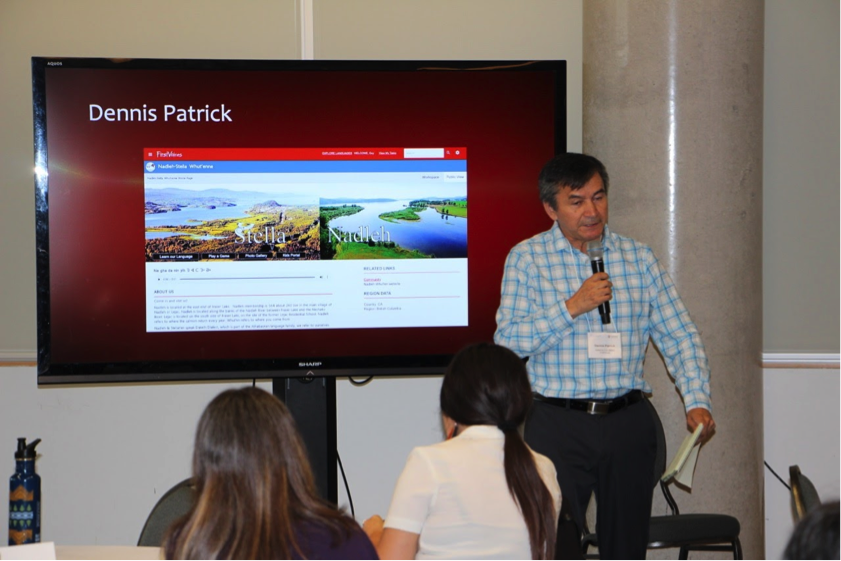
Dennis Patrick, a language assistant at the Stellat’en First Nations, seen here during the Elk-Tech event in Sept. 2019, describing the work he does at the First Voices program. (Photo: Peter Pulsifer, 2019).
Languages are essential in helping us navigate through and understand different cultures and their views of the world. The loss of a single language means losing valuable cultural knowledge.
By the end of the century, it’s estimated that more than 40 per cent of the 7,000 languages spoken today are at risk of disappearing.
Canada, which has between 60 to 100 Indigenous languages, faces pressures from commonly spoken languages such as English, as well as a variety of social, political, and historical factors.
A 2016 census reveals that more than 260,000 people speak an Indigenous language on a conversational level. The most commonly spoken Indigenous languages include Inuktitut (from the Inuit language family) as well as Cree and Ojibway (from the Algonquian language family).
In recent years, a growing number of Indigenous youths have shown an interest in learning their ancestral languages. In addition to being an Indigenous right, allowing youth to learn their native languages carries benefits such as revitalizing their cultural identity. Communities where the Indigenous language is more widely spoken also report lower youth suicide rates.
In the spring of 2019, professors Erik Anonby and Kumiko Murasugi from Carleton University’s School of Linguistics became the co-leaders of the Endangered Language Knowledge and Technology (ELK-Tech) group.
Based at Carleton University in Ottawa, ELK-Tech unites experts and researchers from a variety of disciplines such as Indigenous studies, linguistics, as well as computer sciences. Their goal is to collaborate with Indigenous language communities to adapt and develop digital tools to help language learning and documentation.
Most recently, Anonby, Murasugi and their partner, professor David Mould, a Carleton computer science professor and fellow leader of ELK-Tech, were among several Carleton research teams granted funding from the Canada Foundation for Innovation’s (CFI) John R. Evans Leaders Fund (JELF). Along with $64,000 granted by CFI, a matching grant of more than $32,000 offered by Carleton and an additional $64,000 to be funded by other partners, will contribute to help set up the ELK Centre, a physical space for the initiative.
“The goal at the centre is to bring together all the people who will be working towards the goal of language maintenance and revitalization,” said Murasugi.
While the launch date for the ELK Centre is to be determined, Anonby confirmed that the University has set aside space for the centre.
Murasugi also mentioned their focus is on technology and to develop digital tools that will be useful in the daily lives of Indigenous and minority language speakers.
Technology, Anonby said, is one of the main causes behind language endangerment “as part of globalization.” In terms of the internet, despite increasing language diversity, English is considered the dominant language. The more time people spend on English-dominated websites, the more their use of Indigenous languages – and by extension, their connection to the natural world – slowly declines.
On the other hand, Anonby and Murasugi acknowledge that technology can be an effective tool for language revitalization and documentation.
“It offers potential for strengthening languages if it's used in ways that are meaningful for communities and are technologically and linguistically grounded or supported,” Anonby said.
While technology is an important tool, it is not the sole solution.
“Another key part of that is community involvement and community guidance in the design and use of the tools and also the control over the data that's collected through the use of the tools as well,” Anonby said.
Allowing communities to guide the process of strengthening their languages is an important part of this project.
“It's not just us doing it and saying, ‘oh, look what we've developed’,” Murasugi said. “It's doing it in collaboration with the communities and asking them and discussing what would be useful to them and how we can help provide those tools.”
The tools in question involve more than just automatic learning and language preservation in a digital database They also include encouraging collaborative learning and documentation.
“Because digital technology can be a solitary enterprise, we want to encourage people to use these tools together,” Murasugi said.
Most recently, the COVID-19 pandemic has introduced new challenges and restrictions in terms of research and communication. As a result, the ELK-Tech team, as well as other organizations and programs focusing on language revitalization efforts such as First Voices, will be forced to modify how they interact and collaborate with Indigenous language communities in ways that work best for them. Especially communities with limited technological access.
Due to the threat posed by COVID-19 on Indigenous and minority language communities, Anonby mentioned there is a growing urgency for language revitalization efforts. Elderly, fluent speakers of these languages are especially vulnerable, which makes their cultural and linguistic knowledge even more valuable. The ELK Centre initiative aims to help pass this vital knowledge down to future generations before it's too late.
“Language is a living phenomenon. The work that we do is especially focused on strengthening language as something living within language communities,” Anonby said.
By: Matthew Guida

As a native Montrealer, I graduated from Concordia University with a BA in Anthropology and a minor in Film Studies. I am currently studying for my master’s degree in Journalism at Carleton University in Ottawa. My interest in journalism began while attending Concordia. I was a frequent contributor to the university’s independent newspaper, The Concordian. I further honed my skills and experience by working as a List Writer for the entertainment news website Screen Rant. Since I started attending Carleton University, I have strived to further improve my skills as a journalist in not only print, but also in the fields of data, investigative and broadcast journalism. In the past year, I have also developed a growing appreciation for radio journalism and podcasts. My current interests lie in studying the future of the journalism industry, writing and researching pop culture and social media trends, as well as furthering my career in the field of journalism.
